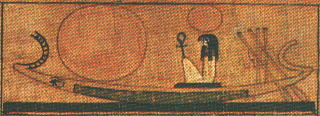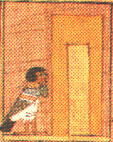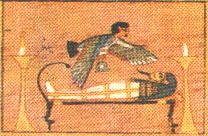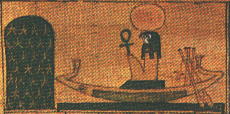|
|
The Papyrus of Ani |
|
|
|
The Papyrus of Ani |
|
 This is an English translation of the Papyrus of Ani, a copy of the Egyptian
Book of the Dead, dating from the 19th dynasty (ca. 1250 BC?). Ani was an
official in the court of a 19th dynasty king--his title was "Scribe and
Accountant of the Offerings of All the Gods."
This is an English translation of the Papyrus of Ani, a copy of the Egyptian
Book of the Dead, dating from the 19th dynasty (ca. 1250 BC?). Ani was an
official in the court of a 19th dynasty king--his title was "Scribe and
Accountant of the Offerings of All the Gods."
This scroll was placed in
his tomb to provide him with the hymns, prayers, and spells he would need
to survive the dangers of the next life.
 On those browsers which support it, text written in red in the original
papyrus is emphasized like this.
On those browsers which support it, text written in red in the original
papyrus is emphasized like this.
Editorial insertions and comments are placed in square brackets, [like
this].
 The chapter numbering scheme use by Egyptologists for the Book of the Dead
is based on the numbering used by Richard Lepsius in his edition of the
Papyrus of Iwef-Ankh (Das Todtenbuch der Ägypter nach dem
hieroglyphischen Papyrus in Turin, Leipzig, 1842).
The Papyrus of Iwef-Ankh is a much later document,
written at a time when the order of the chapters was fixed by tradition.
In 19th dynasty Books of the Dead, like that of Ani, the chapter order was
not yet fixed (though there is an overall logic apparent in the ordering of
Ani's
papyrus). The chapters of Ani's papyrus are presented here in the order in
which they occur on the original scroll.
The chapter numbering scheme use by Egyptologists for the Book of the Dead
is based on the numbering used by Richard Lepsius in his edition of the
Papyrus of Iwef-Ankh (Das Todtenbuch der Ägypter nach dem
hieroglyphischen Papyrus in Turin, Leipzig, 1842).
The Papyrus of Iwef-Ankh is a much later document,
written at a time when the order of the chapters was fixed by tradition.
In 19th dynasty Books of the Dead, like that of Ani, the chapter order was
not yet fixed (though there is an overall logic apparent in the ordering of
Ani's
papyrus). The chapters of Ani's papyrus are presented here in the order in
which they occur on the original scroll.
 The primary sources used were two editions of
E. A. Wallis Budge's translation
of Ani's papyrus (The Egyptian Book of the Dead, New York:
Dover Publications, Inc., 1967, and The Book of the Dead,
Secaucus, NJ: University Books, Inc., 1960), but I have tried, for the most
part, to make this my own translation.
The primary sources used were two editions of
E. A. Wallis Budge's translation
of Ani's papyrus (The Egyptian Book of the Dead, New York:
Dover Publications, Inc., 1967, and The Book of the Dead,
Secaucus, NJ: University Books, Inc., 1960), but I have tried, for the most
part, to make this my own translation.
"Now what on Earth," you're probably asking, "would possess you do undertake such a project?"
A good question, made all the better when you discover that I have no Egyptological training.
Well... aside from a perverse desire to exercise my Constitutional right to make a complete fool of myself in front of the entire Internet, it all started from a vague interest in the Egyptian language, which went largely unsatisfied until one day when I realized that there would probably be something about the subject in the local university library. Sure enough, they had several Egyptian grammars, from which I taught myself the basics of the language.
It was the search for texts to practice on that led me to Budge's translations. As I worked through them, though, I began to realize that Budge's translation left a bit to be desired... there were a number of errors glaring enough to be obvious even to a beginner such as myself, and numerous spots where the English text bore only a vague and misleading resemblance to the Egyptian text (the University Books edition was especially bad in the latter regard). I think there must have been lots of places where Budge couldn't make sense of the Egyptian text, so he just guessed.
"Surely," I said to myself in a sudden attack of hubris, "I can do better than that." And so the seeds for this project were planted.
Now, 100K or so of text later, I'm not so sure that I've done any better. Almost immediately after starting, I began to realize why Budge had to guess, if that is indeed what he did... upon closer inspection, I discovered numerous errors in the original text, and numerous spots where the Egyptian words bore only a vague and misleading resemblance to understandable sentences. I have often had to fall back on Budge to make sense of otherwise senseless passages.
For the most part I've tried to follow the Egyptian text from the University Books edition--the hieroglyphic text is printed in solid blocks at the top of each page, making it easy to take in large passages at once, whereas with the Dover edition one must contend with the constant interruptions from the interlinear English translation. But this was not always possible--the University Books hieroglyphic text turns out to be crawling with misprints. The Dover hieroglyphic text is much more accurate--whenever the University Books text differed from the Dover text, an examination of photographs of the papyrus (when possible) almost always confirmed the Dover reading.
I've tried to do something with this translation that I've never seen done with any other translation, namely dividing it into lines according to the flow of the original poetry. Much of the Book of the Dead is written in a antiphonal style --i.e. lines come in pairs (or less commonly groups of three or four) united by a common theme or form--which I have tried to show explicitly. I regret, though, that there is no practical way to translate the frequent puns and word-plays that occur in the Egyptian text...most of the alliterative quality of the original is lost in translation.
I'll start off as directly as possible: I don't believe in it. I am as thoroughly skeptical of occult and psychic phenomena as anyone you're ever likely to meet.
It seems that as one pursues an interest in Egyptian culture, one can hardly turn around without bumping into the latest hokum about how the Great Pyramid was built by space aliens to reveal the future course of human history, or how the Sphinx is really the sole surviving artifact of some million-year-old civilization that died out long before the Egyptians came along (to name just two examples that I've heard), and I'm sure that as a result of putting up these Web pages, I'll occasionally be hearing from people who espouse such ideas.
People who want to argue with me about this are not likely to get a very sympathetic hearing. I find it impossible to embrace any idea that the Pyramids, or any other artifact of Egyptian civilization, were built through any agency other than the ingenuity and resourcefulness (and backbreaking labor!) of the Egyptians themselves-- indeed, I find something subtly racist in the suggestion that they couldn't do it without supernatural or extraterrestrial help.
Readers may, of course, read these pages for whatever reason they want, but be assured that my reasons for putting them here are to practice with the Egyptian language, and to gain a greater understanding of Egyptian culture and religion, and not to dabble in any way in the occult.